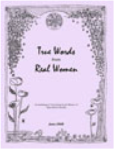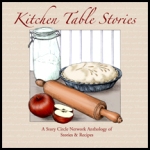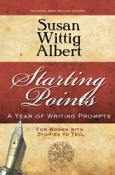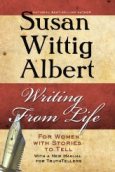Date line: Evergreen Heights, the Big Brown House, January 30th and 31st 2012
Photo: Pop. Erwin A. Thompson. (photo by Janet Grace Riehl)
The story so far: I’m part of a three-person family care team that works to keep my father at home with dignity and independence. Pop lives in the house where he grew up, raised his children, nursed his wife for five years before her death, and now plays out the end game of his life. We each have our jobs. My brother focuses on business. I do my younger daughter thing. My niece lives next door to the Big Brown House and tracks all things medical. Pop’s doctor is only a phone call or a text away. He is prone to Heart Thingies—more accurately known as “atrial fibrillations” or “A-fibs” for short. “Thus, the background,” as my father would say.
Monday, January 30th
The phone rings. I throw off my warm covers and lunge to answer it. Who on earth calls at this time in the morning? “Have his vitals changed?” I recognize the voices of my father’s doctor and then my niece Diane as they consult over the phone. I rush downstairs to my father’s bedroom. My niece turns her head from the phone. “Give me five minutes.” I retreat upstairs, splash my face with cold water, and pull on some clothes before my niece arrives with the update.
“He’s been in A-fib since 2 a.m. He called us at 5. His vitals are low. Dr. Miller wanted to talk to him directly, so she called the house. It’s a hard way for you to wake up.”
I trot downstairs. Pop looks up from his bed. “I’m still here. We’ll make it.”
“That’s what we like to hear.” I touch my forehead to his and inhale deeply. The smell comforts me.
I text my brother. “Daddy in A-fib since 2. Now back to sleep. Everyone is doing their part. I slept until Dr. Miller called the home phone to talk to daddy.”
“Call me when you can.” I do. He comes down from the Upper Brown Cottage.
Thus begins a day of watching and waiting. The A-fib continues, and continues, and continues. Afternoon finds Pop sacked out in his chair. My niece—an expert on the mortgage lending crisis—hunches over her laptop. Her makeshift desk is his desk. Our long dining room table is piled high with his projects: historical clippings, photos in binders awaiting commentary, a novel-in-progress, and whittled critters in all stages of completion.
I poke my head in from the kitchen where I’m making ginger cookies. “How’s it going?”
“His pulse is still rapid and erratic.”
Since his big heart thingy on New Year’s Eve Day, the A-fibs just keep a comin’. For the past four years they’ve usually lasted 6 to 9 hours, now they go on and on. Amazingly he snaps back, but each time his heart gets weaker.
“I need to go on some errands, but I can sit with him when I get back,” I say.
When I do, Pop’s pulse is slower and more regular. He eats a bit and then takes his medicine. It’s not quite over, but the crisis has passed. My niece goes home.
Tuesday, January 31st
“How are you?”
“Not too good. I can’t get a reading on my blood pressure or my pulse.” He keeps a blood pressure rig by his bed and records the readings every half hour. If he can’t get a reading, then he’s definitely in A-fib.
I cradle his wrist to feel for his pulse. My nursing skills are pretty limited. I can fluff a pillow and fetch a meal, but I’m not too good at this pulse-taking. Even I, though, can feel his heart’s wild beats.
“We’d better call Diane.”
She’s good at this stuff. When she comes, she grabs our clock with the second hand and counts as well as she can with a heart that’s racing to the finish line. Not good. She steps out to contact Dr. Miller, and then comes back to take his temperature. It’s 92 degrees. Finally we get a blood pressure reading. Not too good, as Pop said. Low temperature. Low blood pressure. Back to Dr. Miller.
“His systems are shutting down. He may have 24 hours. Keep him as comfortable as possible.”
We keep a little pill handy that lowers the heart rate, but, sadly, it also lowers the blood pressure. That’s the tight rope we walk in calibrating the medication. Should he take it?
“Yes,” says Dr. Miller.
Later I visit Pop as he lies in bed. “I’m cold.” He’s shaking under the covers, but in no pain. “This isn’t moving in a good direction,” he says. “It’s not following the usual cycle. This thing is just going on and on. We’re in a new phase.” That’s the curse of a clear mind. He knows. But, he doesn’t know all. We’re not about to march in to tell him he has 24 hours to live, right?
These prognostications of his imminent demise have been in play for the last five years. It’s not just the doctor thinking out loud. It’s us. It’s him. “Janet, I don’t think I’ll make it to spring,” he told me the fall of 2007. But he did. And time and time again he’s made it beyond his due date. As Mark Twain said, “Reports of death have been greatly exaggerated.” But this time? It seems ever more real that the end could be in sight.
There’s no hospice here. No professional caregivers. Not a blink of a thought about trekking to the hospital. Just us. Just Daddy. Just whatever is going to happen. But, if he were to die today, it would be a dream death. The family members who live on top of our hill are all here. We’re on our best behavior. I’m strong and steady. Daddy is charming. It’s a day of tender and funny moments. A day of reconciliation.
While my niece and I love each other, it’s not an easy relationship. We’re not easy people. None of us in the family are, really. But, after she and I discuss how this all might go down, she starts toward the door to head out for a walk. Her nerves are stretched tight. She’s on the medical front line. Then, she turns.
“I want you to know that I see you reaching out to me. Time and again, even when I rebuff you. Even when it doesn’t connect with me. It’s like a marriage vow. You don’t give up. You’re constant in your effort. I appreciate that.”
Constancy isn’t my strong point, though god knows I try. I’ve taken it as my watchword for the year. My hand flies to my heart in surprised fullness. To be seen—even when my wish to make it work falls on its face. I tear up a little.
“Thank you. I can’t tell you how much that means to me.” We hug lightly and she slips out the door.
Even though we don’t tell my father directly that we fear his time is nigh, the steady stream of visitors throughout the day must give him a clue. My brother and his wife, my niece and her husband, their girls, and me.
“My, I have a lot of people coming to see me today,” he jokes.
And, I’m around to greet them. Daddy likes it when I’m a good hostess. Diane’s husband drops by on his way to a job.
“Is he awake?”
“No, but that’s not a big deal.” He’s been sleeping lightly most of the day. I go in first.
“Daddy, wake up,” I whisper. “You’ve got a visitor.” Then, back to the kitchen where I’m cooking bacon in the oven.
My niece comes back to work on her laptop. In the afternoon my niece’s children come home one by one from school. Her youngest shows up first; she sets up shop across from her mother. Even math homework must go on.
“Would you like a snack?” She looks askance at her mother who nods “yes.” We peer into the refrigerator reviewing her choices.
“Would you like something sweet or something nutritious?”
“What about both?”
We settle on lemon pudding, and she goes back to work on her math. She’s wearing a blue fleece jacket. When she goes to see Daddy, he says “Oh, it’s my little blue bird come to greet me.”
Later my older great niece comes by on her way home. She sets down her book bag, and goes in to greet him.
“I love you, Papa.”
“I’m glad you do. That’ll help me get through it. Have you watered your farm today?”
Her farm is several flats of different kinds of grain that look like grass. It’s her experiment for her science project. She’s fascinated by erosion. This is one of her days to water it; she scoots down to the basement.
When she comes up, I walk with her to the porch. Much to my surprise she comes to hug me. I hold her for a long time while she cries. “We’re gonna make it through,” I tell her, echoing the words I’ve heard my father say so many times.
Then I rejoin my niece and her daughter. Diane and I speak softly about Pop’s condition. It’s a bit hard for my great niece to concentrate on her homework. She looks up, concern shadowing her young face.
“Would you like a hug?” her mother asks. And she comes for a cuddle.
I draw a straight chair close by. “Come on over here. And, none of those wimpy hugs.” I draw her to my lap where she puts her head on my shoulder. We rock.
My brother and his wife come to visit throughout the day. We eat supper together. I’ve made a seafood gumbo that goes down pretty good. Pop’s better now, and asks for his favorite supper: bacon with little tomatoes.
He’s pulled out once again. How, I don’t know. None of us do. “Who knows but God?” as the lorry slogans in Ghana proclaim.
On a Masterpiece Theater program I first heard the term “end game.” Though “end game” comes from chess, in that context “end game” referred to the end of a lineage—the end of a way of life for the landed gentry. It works here, too. Pop is the family patriarch. When he goes, a generation passes and with it a way of life. He’s trained us up well, and we carry his line, each in our own way. But, there’ll never be another him, that’s for damn sure.
Only a few pieces are left on the chess board. The king stands alone facing the dark knights of old age and death.
_____________________
Pose questions about practical creativity; give ideas for future cycle themes; and join in the dialog. Learn more about our audio book “Sightlines: A Family Love Story in Poetry and Music.” Become a Riehlife villager.







Oh Janet, your words here take me right back to those days and nights sitting by dad’s bedside, waiting for the inevitable. There was a sense of time standing still, as if we had all gathered at the intersection between what is here and now, and what lies beyond. My heart goes out to you. There is no way to prepare ourselves for the loss of a parent. Sending you much love, hugs and blessings. xxx
Thank you, Edith. That means a lot.
Thank you for sharing this part of your journey today,,Janet. It’s an honor to walk with you and your family.
Peace, Mary Jo
Thank you, Mary Jo. I wrote this piece this morning–a week afterwards. I wish I could remember the real dialogue. Some really funny stuff.
And you?
So beautiful, Janet. I got a little teary as I read this. So much love, your family surrounding your dad with love, each doing what they can. Let the love and forgiveness go on, beyond the end game.
Thank you, Fran. It’s so good you were here and met Pop.
Janet,
As usual, I’m too much under the influence of your description of a mysterious period of our lives to react right now. I’m sitting here with tears overflowing. Your words give me courage to face the challenges my own dad, a player well into the end game, presents. We’ll make it through, too.
All the best,
Alice
Yes, we’ll make it through. What a blessing to be companions during this “mysterious period.”
Thanks for sharing this part of yours and pops’ journey, Janet. You will make it through,
Thank you Damaria. How is Mma and all? She is such a lovely mother. I’m glad I had a chance to meet her in 2008.
I felt I was there with all of you. Love to you, your Dad and the rest of the family.
Thank you, Arletta. I’m glad you were here and met Pop.
Beautiful observations from the heart, Janet. The end game of this lifetime can be colored by so many people and things, thoughts and emotions. When I read these words, the picture in MY heart is love entering with each breath, each moment.
Thanks for the beautiful image Eileen.
I’m so glad that I had that time with your pop. I can “see” what’s going on with you and your family. Much, much to you both and to your family. Never an easy road no matter how often you tread.
Thank you, dear friend.
Lovely, Janet…your father’s strong spirit shines through, as always. Your writing brings the days alive for us, the interplay between family members, the touch of a forehead, the seafood gumbo. Thank you for bringing us along down this difficult path.
Thank you Khadijah, for letting me know that the details I had worked. I was sorry to forget so much funny and touching dialogue. My father’s way of putting things is so distinctively his.
Thanks for sharing this, Janet. It brings all your friends into the circle, to be there with you.
Yes, and you and Mary are so good to have in that close-in circle.
In terms of the writing is it in line with the things you liked about the two earlier pieces in this series? My memory is such a seive and I don’t journal anymore. So much detail and dialogue drops out. I spent most of the morning writing this. Everything runs together for several days. After writing I remembered some more things. I want to “work back into the piece” and expand it I think.
Janet
Janet,
beautiful post. the grace and peace strike me, gently. I imagine my mother’s last days with my grandparents. I hope to show patience and grace when my turn comes.
Thank you, Carol. It’s all a training, right? Sometimes patience and grace. And sometimes not. 🙂
I’m in tears, Janet, after reading this account of your Dad’s “endgame.” I’ve never met him, but through you, I feel I know him. One of his “whittled (cat) critters still stands oversight on my kitchen window.
Thank you, Karen. Your family has that same deep history and sense of identity. So, you understand pretty well.
Janet
I just love your Dad. He has raised a fine, talented, compassionate daughter. End game is a tough stretch and I’m glad you are able to take a step back via writing and observe the process, it’s as if you are hovering above the room and observing as you participate. Astonishing.
Give Pop a GIANT hug. I have my carved critter on my altar today and am sending you all hugs.
Thank you, Jude. My memory is such a sieve and I don’t journal anymore. So much detail and dialogue is lost. I wrote it this morning and did my best. I’m glad it did the job. –Janet
Two thoughts, Janet. First, your father is so fortunate to have you and the family near him, with him in body and spirit. So few face the “end game” together with such loved ones. Second, your father’s life has flowed like a lyrical poem, highs and lows, insights and accomplishment, pain and loss, the wonder and mystery of life. And, like a poem, no one knows what the last stanza, the last couplet, the last line shall be. But I know it will be beautiful and fitting. You have done well.
Gerry, you were so kind to make the video of Pop for his 95th birthday in 2010. You are very good at these! I’m glad that you got to know him in person and to see our place. Thank you for your beautiful comments.
Thinking of you and yours, Janet. Much love and gentle blessings….
Janet’s gift for down home storytelling is again self-evident in this installment of daddy care where is longevity genes still serve him.
Although I’ve not meant Erwin in person, I know a bit about him through Janet’s writings, as well as his own. I also have one of Erwin’s wood carvings, Mr. Fox, prominently displayed. Erwin’s a doer, which is a legacy to us all.
Let me suggest that the endgame is not death; the endgame is understanding.
Be well, Erwin. You are appreciated.
Thank you–as always–Eden. Yes, “down home storytelling.” That’s exactly what I aimed for. I wanted to show the matter-of-factness and the life-goes-on-ness of the day. You were so devoted to your mother in caring for her up to the time of her death. You know what it is.
Pop’s life and his experiences shine like the North Star. His vibrant energy touches all of us through you, Janet. And, just like that star he will continue to be a beacon for the people who had the opportunity to share this journey with him.
Thank you, Hal. Your poetry touches my heart.
What an amazing gift to have around you people who love and genuinely care for you. When my mother was dying, I slept in the bed next to her in the last days. One morning she woke up, looked at me and asked, “What are you doing here?” It took me a minute to figure out what she meant. When I did I replied, “Well, you’re not dead yet, Mom.” She rolled her eyes, “Oh,” she said. “This is going to be more trouble than I thought!” And she was right. Dying can draw out long beyond the time when care givers have given all they believe they can possibly give. Mutual support of each caregiver is absolutely essential and it’s something we too easily forget. Janet’s narrative is a wonderful model of caregivers supporting each other in the service of a man they love and who loves them. Life never goes as you dream it should; neither does the dying. I’ve got a little carving Pop made of a fox. I’ve got it on the bookshelf near my desk to keep an eye on him during Pop’s journey.
Hal, I love your story and your exchange with your mother. Yes! Those tough old Midwesterners. That’s exactly the tone with my father and I. If only my memory were better, or if I were more diligent about recording. Thank you for sharing your story and your wisdom.
HI Janet – Your words were very moving. You folks are obviously going through a lot together, tho perhaps your father’s humor helps make things a little lighter. What I find most moving is the cocoon of love you all are weaving around your father (and for each other). He seems to be very aware of all the caring and love: I can think of no greater gift to give another person in their final days than to be enveloped in such a way. I hope his passing, if that is around the corner, will be as peaceful as possible, and that your memories of the love that is being shared will bring healing to you all in time.
Thank you, Eliot, for words that come from your heart and your life.
This is a beautiful remembrance, Janet. I was taken back, of course, to my own experience, now two years ago, caring for my mother during the last year of her life. Like Hal, I slept with her for a few nights, and that experience is still vividly with me. So intimate and tender. Maybe you didn’t remember everything, but what you put down was quite enough to help us know all of you, a family “leaning toward the light” as Barry Lopez put it. I’m so glad for those healing moments for you, and glad for you family that they have your wonderful energy there. Blessings on your Pop and his fine offspring.
Thank you, Susan. It’s so wonderful to hear the stories from others of our generation. When I wrote “Sightlines: A Poet’s Diary” I was very focused on it and writing things down. I haven’t written about the daddy care until recently. It felt quite enough to live it without writing about it. But, it seems useful, and so I’m glad I have.
I’m struck by how many of you reading this have critters carved by my father. He makes them with two blades of an old pocket knife. His menagerie lives all over the world. They seem to perch on desktops and mantles and kitchen windows and anyplace people spend a lot of time. His critters are good company.
Janet: This reflection on your dear father is beautiful. You are a fine daughter, sister, aunt and most dearly a good friend. Much love, Julia & Howard